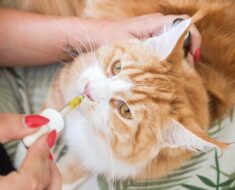Ah, cats. Those furry enigmas who grace our lives with cuddles, chaos, and an uncanny ability to find the most inconveniently placed water glass. But even the most discerning feline foodie has dietary restrictions. Just like that adorable face can’t resist a feather toy, it sometimes craves forbidden treats that could spell trouble. So, let’s unveil the “kitty kryptonite” lurking in your kitchen cabinets.
The Chocolate Conundrum: This one’s a classic. Theobromine, the fun-sounding culprit in chocolate, acts like caffeine on overdrive for cats, causing vomiting, tremors, and even seizures. So, keep that cocoa stash tightly sealed – even a nibble can be dangerous.
The Milky Myth: Contrary to popular belief, most adult cats are lactose intolerant. That saucer of milk might bring on a symphony of tummy troubles, leaving your kitty feeling more sour than purry. Stick to water – it’s purrfectly hydrating anyway!
The Raw Deal: Raw meat and eggs harbor nasty bacteria like salmonella that can wreak havoc on your cat’s digestive system. Stick to commercially prepared cat food to avoid these unwelcome guests.
The Grapevine of Danger: Grapes and raisins, sweet as they may seem, are highly toxic to cats and can cause kidney failure. Keep that fruit bowl out of reach, and opt for cat-safe treats instead.
The Allium Alliance: Onions, garlic, chives, and their leafy brethren contain compounds that damage red blood cells, leading to anemia in cats. Keep these pungent pantry staples far from your feline friend.
The Xylitol X-Factor: This artificial sweetener, found in sugar-free gum and other products, can cause dangerously low blood sugar in cats. Be extra cautious with anything labeled “sugar-free.”
The Plant Power Peril: Lilies, tulips, and even seemingly harmless spider plants are toxic to cats, causing vomiting, kidney failure, and other problems. Opt for cat-friendly greenery like catnip or spider plants specifically labelled safe for felines.
Remember, this is just a whisker of the forbidden foods list. Always consult your veterinarian for a comprehensive overview and specific guidance based on your cat’s individual needs.
Bonus Tip: Engage your cat’s natural hunting instincts with puzzle feeders and food toys. Not only will it keep them mentally stimulated, but it might just distract them from those tempting human treats – until next time, that is!
So, arm yourself with this knowledge and keep your feline friend safe from forbidden feasts. After all, a healthy cat is a happy cat, and a happy cat means fewer mysterious hairballs and more purrs of contentment. Now go forth and conquer the kitchen – for your cat’s sake, of course!





